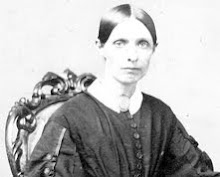
Writing this Witness Tree Book is harder than I thought. I am starting to develop a whole new appreciation for the writing process. My mom has gone through this twice now and while I sympathized with her I don't think I really "got it" until now. There is so much I want to include in this book-the trees are the main focus, but there is so much surrounding them. I thought I would start with a grove of trees on West Confederate Avenue near the Pegram Battalion Marker.

As I was researching locations, I came across a fact about one of those witness trees. It seems that a Confederate Brigadier General, William Dorsey Pender, was mortally wounded near this tree.

And so the "domino phenomenon" begins; I research one thing which leads to another, and another, and another! This could take a while. I am so fascinated with the personal stories behind the war.
Dorsey Pender at twenty-nine was the youngest and the fastest-rising major general in the Army of Northern Virginia at Gettysburg. He had just been placed at the head of "Powell" Hill's old Light Division, one of the two best divisions in the army. Along with Maj. Gen. John B. Hood, who commanded the only division which could match the Light Division, Pender was the man for whom Lee and others predicted a great future. Pender was thin and handsome, with dark hair and an olive complexion; he wore his beard neatly trimmed, short and pointed. With soft brown eyes and a kindly expression, he combined a sweet and gentle disposition with a strict sense of discipline. "Firm, very courteous," was how one officer described his manner. Men who did their duty found him good-natured. Though he was modest and spoke little, when he did speak his voice was low and cultivated, a languid Carolina drawl. He was sensitive about his receding hairline, referring to himself half-jokingly in a letter to his wife as "quite bald," especially after a superficial head wound at Second Manassas. Pender was rather short--another sensitive point--but was "well formed and graceful," according to his brother.

One exploit suggests he was powerfully built: Serving as a dragoon in the Northwest against the Indians, he was riding alone when he found himself face-to-face with an Indian chief at the Battle of Spokane Plains. With no time to draw his sword, he grabbed his attacker's arm as it was raised to strike him, then grabbed the man's neck. Thus holding the Indian powerless, he held on with both hands, then spurred his horse and galloped toward his dragoons. When he reached his men he threw the Indian down among them.

Pender's feelings about war were complicated--he wrote often that he was "sick of soldiering and especially the fighting part." Though his wife accused him of having a "cold, unfeeling nature," and he admitted to being an unusually earnest young man and one who did not much express emotion, Pender was simply one who expressed himself through heroic deeds. A doctor called Pender "a very superior little man though a strict disciplinarian . . . brave as a lion," who "seemed to love danger." One officer summed him up: "He was one of the coolest, most self-possessed and one of the most absolutely fearless men under fire I ever knew."
Wikipedia has this about Pender:
"On July 2, Pender was posted near the Lutheran Seminary. During the en echelon attack that started with James Longstreet's assault on the right, from the Round Tops through the Peach Orchard, Pender's division was to continue in the attack sequence near Cemetery Hill, to the left of Richard H. Anderson's attack on Cemetery Ridge. Pender was wounded in the thigh by a shell fragment fired from Cemetery Hill, and turned command over to James H. Lane. His division's momentum was broken by the change in command and no effective assault was completed. Pender was evacuated to Staunton, Virginia, where an artery in his leg ruptured on July 18. Surgeons amputated his leg in an attempt to save him, but he died a few hours later.
Pender is buried in Calvary Churchyard in Tarboro, North Carolina. He is memorialized in the name of Pender County, North Carolina, founded in 1875. He is the posthumous author of The General to his Lady: The Civil War letters of William Dorsey Pender to Fanny Pender, published in 1965. During World War II, the United States Navy commissioned a Liberty Ship the SS William D. Pender in honor of the fallen general."

Of course, I had to look into the book of his letters to his wife-it fascinates me whenever I can gain insight into someone's mind; especially that of a soldier in the Civil War. My mind has such a hard time grasping what these men must have faced.

In a letter to his wife, Fanny on March 16th, 1861 from Montgomery, Alablama he writes:
"I have no doubt I shall be as well off here as anywhere else, but darling-I cannot feel contented, quiet, or happy away from you. You have become necessary to make me feel all was right.I feel exactly as if some part of me was absent. You ought to be delighted at my occasionally leaving you for it shows me more plainly than anything that you are my wife indeed."

What an eloquent writer, not to mention this was a guy in his twenties who had taken on an incredible amount of responsibility.
Its amazing how being interested in some special trees has opened my eyes to so much more than I ever knew existed.


















No comments:
Post a Comment